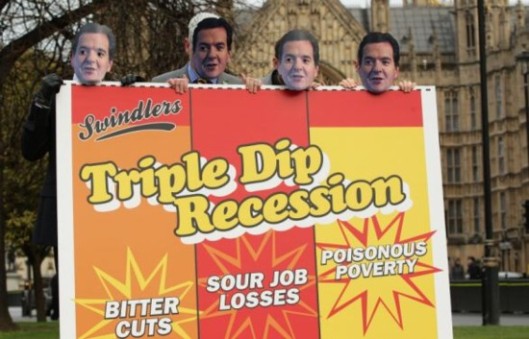
Triple-dip breakfast: Will we all be dining on the sour cereal of recession again, when GDP figures are published on Thursday morning?
Thursday will be another ‘crunch’ day for our part-time Chancellor of the Exchequer – he’s having quite a lot of those lately, isn’t he?
Only last week, the academic justification for his austerity policy was disproven by an American student (oh, the shame!), and then his former allies at the International Monetary Fund distanced themselves from him (oh, the betrayal!) saying he should calm down a bit.
That’s the best advice this columnist has ever heard the IMF provide; if not for his own health, then for the nation’s.
Thursday, though, is a really big day. On Thursday, GDP figures for the first quarter of 2013 will be published.
It is a sign of how low expectations have fallen, that all the economic commentators are saying the best we can expect is to have kept out of a triple-dip recession – with falls in output due to the weather, among other things, making that unprecedented outcome more likely.
There is a problem with all of these predictions, which should be obvious to those of us living in the real world: Short-termism.
It’s all about how the UK managed in the last quarter, how it will manage in the next; what the situation is today. What about six months from now? What about next year? What about 2015, when we’re all expecting an election and the chance to banish this nightmare? What about 2017-18, when 0sborne still reckons he’ll have eliminated the budget deficit (fat chance)?
The fact is that the only options open to a Chancellor in the current climate are unpalatable to the Boy.
He could boost investment in infrastructure, in a bid to make this country a better place to open – and carry out – business. The trouble is, this tends to be a long-term project and he no longer has the time. His chances would have been better if he had started this in 2010, but his government cancelled as many such projects as they could back then, claiming it was more important to cut public spending in order to balance the books.
That was a vain hope. Without new investment, the country has lost revenue.
But if that is unpalatable, the other alternative is likely to make him choke on his pate de foie gras (or whatever it is these posh boys ingest): Increase the spending power of the poor.
It is known that the ‘trickle-down effect’ is a myth – giving all of a country’s money to the very rich, in the belief that they will spend it, boosting the economy and the income of the poor, is nonsense. What they actually do is bank it – in offshore tax havens, most likely. That is what 0sborne has been doing; it is another reason the economy has bombed.
It is also a rock-solid fact that poor people do spend their money – or as much as they can get their hands on. When you are constantly struggling to make ends meet, it’s very hard to keep cash in the bank – you have to spend it on food, clothes, rent, heat, light, water… the list is endless, because it constantly repeats.
When you don’t have much cash, as Edmund Blackadder once said, you feel like a pelican. Everywhere you turn, there’s a large bill in front of you.
That money does work for society. It reinvigorates the economy as it filters through different hands. And it brings with it the extra joy of fiscal multipliers – every pound that gets put into the economy is worth more after it has been through.
The trouble is, Gideon shut off that money supply. He raised VAT, making it harder for working-class people and those on benefits to buy certain economy-boosting products, and then he and Iain Duncan Smith spent the last few years on their project to depress wages.
(For clarity, it goes like this: The DWP makes the benefit system so difficult to navigate that people in receipt have to do their utmost to get off-benefit as soon as possible. This means they are constantly looking for jobs, which in turn makes it possible for employers to refuse pay rises for their workforce, with the classic line that “there are plenty of other people who’d be happy to have your job, you know!” You didn’t really think the benefit cap was about making work pay, did you?)
Say what you like about Labour, but they’ve got the right idea when it comes to the money supply. Ed Balls wants to cut VAT; he wants to bring back the 10 per cent tax rate for the lowest-paid; he wants to bring in a National Insurance holiday for companies that agree to take on new employees.
These are measures that will help.
What is
Vox Political